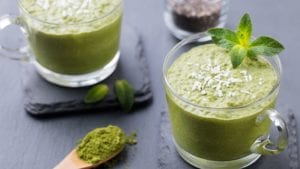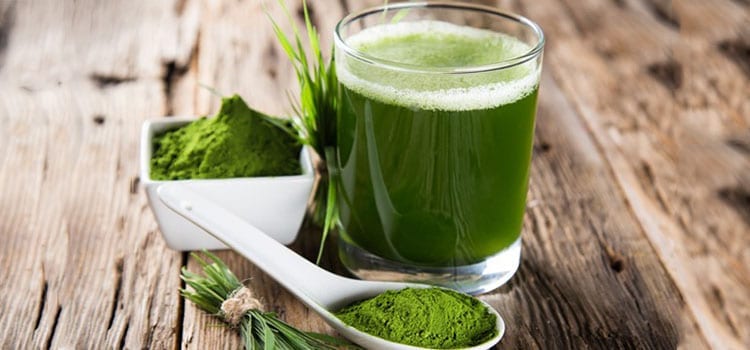There are many powdered green drinks out on the market right now, some will give you a boost of energy, some will bump up your protein, and some contain extra vitamins…but where is the digestion love?
Greens for healthy digestion can be an easy fix for gut health if you know what you are looking for in your green drink ingredients. Look for blends that include ancient grains, seeds, grasses, and spirulina. This mix of these healthy ingredients provides a natural, gentle prebiotic for healthy digestion, which is the foundation for whole-body wellness. Before we further dissect each of these ingredients, let’s take a look at the importance of prebiotics.
You may have just read the word prebiotic in the paragraph above and thought…was that an error, isn’t it spelled “probiotic?” No, that wasn’t a typo! Probiotics are important, and thanks to effective marketing and education over the past decade, it’s obvious to most people that these friendly bacteria provide a host of benefits for the gut, brain, immune system, and more. But as it turns out, probiotics alone don’t represent the whole story. Prebiotics are just as important for whole-body wellness.
Bonus benefits of prebiotics
Prebiotics are non-digestible carbohydrates that serve as food for probiotics. Typically found in high-fiber foods such as whole grains, bananas, greens, onions, garlic, soybeans, and artichokes, prebiotics are necessary for probiotics to grow and multiply. The problem? Most people don’t get enough fiber, or the variety of fibers needed to feed a diverse community of bacteria, which is emerging as the key to a healthy microbiome. Prebiotics and probiotics are better together. When paired with probiotics, prebiotics has been shown to improve the survival of probiotics as they pass through the digestive tract and support the growth of probiotics1 (Mayo, 2019).
Greens for Healthy Digestion
 Now that you’ve had a brief glimpse into the importance of prebiotics, let’s explore some ingredients to consider in your greens for healthy digestion. One ingredient that should be high on your list is ancient grains. You can think of “ancient grains,” as kind of a sub-type of the whole grain, and this sub-type includes varieties of quinoa, millet, buckwheat, amaranth, chia seeds, farrow, spelt, and flax. We can trace the roots of grains back to the beginning of time but unlike wheat, which has been constantly bred and modified; these grains have largely been unchanged over the past several hundred years. Many ancient grains are actually gluten-free, making them a good choice for those who have gluten allergies. Ancient grains contain lots of essential vitamins, particularly B vitamins, minerals like magnesium and potassium, more amounts of iron, and they also, most importantly, contain protective elements like fibers and antioxidants, which keep your gut healthy and balanced2 (Palmer, 2014).
Now that you’ve had a brief glimpse into the importance of prebiotics, let’s explore some ingredients to consider in your greens for healthy digestion. One ingredient that should be high on your list is ancient grains. You can think of “ancient grains,” as kind of a sub-type of the whole grain, and this sub-type includes varieties of quinoa, millet, buckwheat, amaranth, chia seeds, farrow, spelt, and flax. We can trace the roots of grains back to the beginning of time but unlike wheat, which has been constantly bred and modified; these grains have largely been unchanged over the past several hundred years. Many ancient grains are actually gluten-free, making them a good choice for those who have gluten allergies. Ancient grains contain lots of essential vitamins, particularly B vitamins, minerals like magnesium and potassium, more amounts of iron, and they also, most importantly, contain protective elements like fibers and antioxidants, which keep your gut healthy and balanced2 (Palmer, 2014).
When we talk about “seeds and grasses”, we are thinking of pumpkin seeds, sunflower seeds, chia seeds, etc. And the grasses we are referring to are barley grass and wheatgrass. These seeds are great sources of dietary fiber. In fact, shelled seeds provide 1.1 grams of fiber in a single 1-ounce serving3 (Brown, 2018). These seeds also contain antioxidants that can help reduce inflammation and protect your cells from harmful free radicals. Grasses like barley grass and wheatgrass, on the other hand, provide rich amounts of vitamins and minerals, many of which are antioxidants. Chlorophyll, the substance that gives these grasses their green color, may also provide numerous health benefits, like promoting healthy blood production, detoxification, and wound healing. In terms of digestive benefits, these grasses contain digestive enzymes, which help reduce toxic and indigestible materials in food4 (McLaughlin, 2018). These enzymes may also improve wellness in people with indigestion and food allergies.
Spirulina, blue-green algae, is a freshwater plant that is probably one of the most talked-about superfoods today. This immune-strengthening superfood detoxes the body of heavy metals like arsenic, may help lower blood pressure, reduce cholesterol, and also helps to eliminate candida5 (Edwards, 2019). By eliminating candida, spirulina promotes the growth of healthy bacterial microflora in the intestines.
How can I improve my gut health fast?
Sometimes you can just tell when your gut health is a little off. Your food sensitivities may become a bit worse, you may have more gas, bloating, and skin issues, and you may also feel more tired. These are all classic signs that your gut health could use a little TLC. Here are some of our top tips for improving your gut health…and fast.

Start taking a probiotic. Incorporating a clinically studied probiotic into your daily routine is a great place to begin, in terms of improving your gut health. A quality probiotic can help your beneficial bacteria flourish and can keep harmful microbes in check. This can help to manage gas, bloating, and other GI issues. Look for a probiotic that is shelf-stable, which means it can safely be stored at room temperature, and also make sure it is guaranteed to be viable (live cells) through expiration, not just at manufacture. Look for a probiotic that lists the full species and strain codes and can verify strains with DNA sequencing, to ensure that what is on the label is in the capsule.
Move every day. Adding physical activity to your day—even a brisk 10-minute walk—can benefit your gut health. The amount of blood diverted from your digestive system when you move decreases because your muscles are more efficient when you exercise. Regular exercise also makes positive changes to the bacterial composition in your gut.
Eat a diverse range of food. There are many different species of bacteria that live in your intestines. Each species plays a different role in maintaining your health and each requires different nutrients for growth. This is why it’s important to eat many different types of food, especially fruits, vegetables, beans, and legumes. It’s also smart to add fermented foods like kimchi, miso, sauerkraut, and yogurt to that list. Many fermented foods are rich in Lactobacilli, a type of bacteria that can benefit your health.
Incorporate more prebiotic fiber into your diet. Probiotics feed on nondigestible carbohydrates called prebiotics, which encourage the growth of beneficial bacteria in the gut. Prebiotics essentially act like fertilizers, stimulating the growth of healthy bacteria. Prebiotics can be found in many different fruits and vegetables, especially those that contain complex carbohydrates like fiber (think – chicory root, onions, bananas, artichokes).
What superfood greens aid in healthy digestion?
Your body can actually create new microbiota in as little as 24 hours just by changing what you eat, which is pretty miraculous. Here are some of the top foods we recommend to support a healthy gut:
Kimchi: This fermented cabbage staple is rich in two different classes of good bacteria associated with better gut health, Lactobacillus, and Bifidobacterium. Research shows that fermented kimchi alters the bacterial environment of the gut, potentially reducing the risk of insulin resistance, obesity, and even high blood pressure.
Garlic: In addition to providing inulin fiber, garlic is also rich in the natural prebiotic fructooligosaccharides (FOS). Research has shown that garlic increases the good Bifidobacterium in our gut, which may help prevent some gastrointestinal diseases and irregularity.
Apples: An apple a day keeps the doctor away…which may be due to its pectin content. Pectin makes up about half of the fiber content in apples and has been shown in some research to increase the total SCFA content (i.e. bacteria’s favorite food) in the bowels. It also appears to reduce bad bacteria in the gut as well.
Which foods are bad for your gut health?
Now that we know the top three “good gut” foods, and important greens for healthy digestion, here are the foods (and drink) we recommend avoiding, in order to protect your gut health.
Alcohol: We know that drinking too much alcohol is bad for our overall health, but it turns out that it is pretty bad for our gut health, in particular. Research looking at alcoholics suggests that chronic alcohol intake is associated with negative changes in the bacterial microbiome.
Saturated fat: A diet high in saturated fats and trans fat may not be so healthy for the gut. Studies have shown that a diet rich in these fats (like fat from butter or fatty meats) may increase the bad gut bacteria population and decrease the good gut bacteria population.
High animal protein diet: Research has linked animal products like red meat, to an unfavorable microbiome. Studies show that red meat may reduce the beneficial short-chain fatty acids that help feed the bacterial community, promote the growth of bad bacteria, and potentially increase the risk of IBS.
Sugar: The Standard American diet is unfortunately packed with sugar. A diet high in sugar can decrease the number of good bacteria in your body. This imbalance can cause increased sugar cravings, and if you give in to them, it has the potential to damage your gut even more – by continuing to feed the bad bacteria. High amounts of sugar can also cause inflammation in the body. Try to reduce the sugar you consume daily to minimize the unhealthy yeast in your digestive tract.
Next time you are looking for a quality powdered green drink blend, try and pack as many of these healthy prebiotic ingredients into your drink as you can, and enjoy optimal digestive benefits.
References
- https://www.mayoclinic.org/prebiotics-probiotics-and-your-health/art-20390058
- https://www.onegreenplanet.org/vegan-food/what-the-heck-are-ancient-grains/
- https://www.healthline.com/nutrition/11-benefits-of-pumpkin-seeds
- https://www.livestrong.com/article/245706-health-benefits-of-wheatgrass-barley-grass/
- https://draxe.com/spirulina-benefits/
This article is for informational purposes only. This article is not, nor is it intended to be, a substitute for professional medical advice, diagnosis, or treatment and should never be relied upon for specific medical advice.

Share this Post